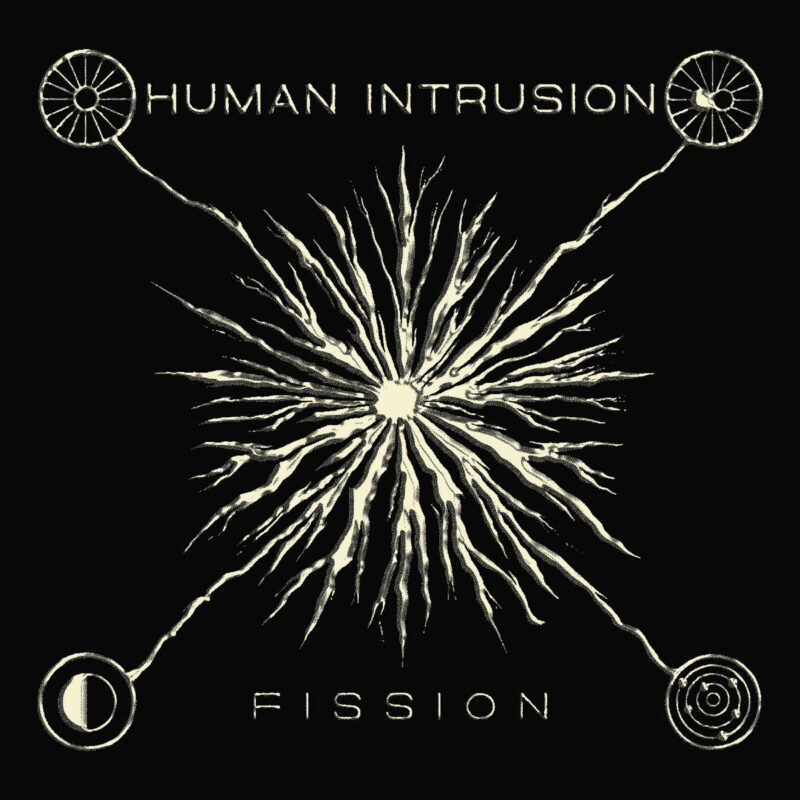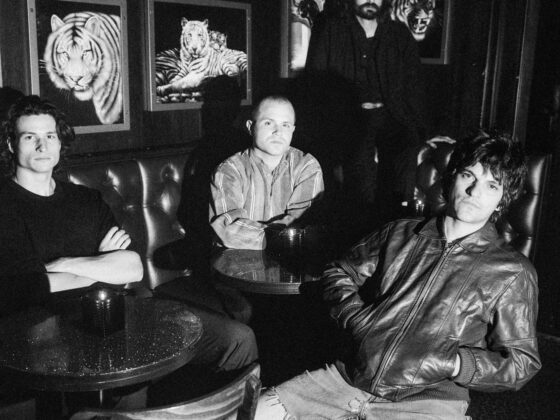In the languid dusk of Melbourne’s streets, Human Intrusion first took shape: two friends turning weekends into quiet laboratories of sound and sentiment. Lewis O’Brien, restless with half-formed ideas, tested them aloud; Penny Walker-Keefe, skeptical but willing, met him in that fragile space where experiment becomes expression. Out of their hesitation grew an unlikely ease, and soon the pair found themselves building something neither had planned but both recognized instantly: a project whose pulse carried the texture of shared solitude.
Now comes Fission, an audacious suite of songs distilled into twenty continuous minutes, released with a wink on limited-edition floppy disk. Its foundations lie in post-punk and new wave, yet it listens backward and forward at once, as though the past were a prism for the future. The record is framed by the language of science, but threaded with hints of something less tangible, something closer to the divine.
Science is everywhere in Fission, but it never feels clinical. At moments it is the hum of electrons racing through a circuit; elsewhere it is the cold clarity of observation, the thrill of naming and knowing. Yet, just as often, the songs lift into something less measurable—a hymn to the ineffable. It is here, in this negotiation between knowledge and wonder, that the record achieves its strange glow. It is a record meant to be heard whole.
The record opens with its title track, a quiet suggestion: tones that seem to rise from the floorboards of their home studio, as if the house itself were humming. From that soft ignition, the EP unfolds in uninterrupted motion, each piece slipping into the next with the calm inevitability of a tide. Guitars stretch like light caught in glass, synths quiver in anxious repetition, and drums throb with a steady patience. Penny’s words arrive less as pronouncements than as fragments of poetry, expanding their meanings in the space between breaths.
Buried follows with an ache both spectral and tender. Penny’s voice, half-concealed yet luminous, drapes itself across ringing guitars, recalling the celestial gloss of Cocteau Twins while remaining rooted in its own vernacular. The song feels less like a performance than an apparition: its harmonies appearing, receding, and shimmering in the ear like a dream remembered too late.
Collider tilts the record toward weight and pressure, a movement into shoegaze and sludgy nineties grit, though shaped with striking precision. Harmonies rise from beneath the dense guitar work, while the rhythm section carries the determination of machinery. It is music that feels forged rather than played, each note hammered into place. From there, Glucose bends toward gentleness. Vocals arrive in overlapping echoes, their psychedelic shimmer surrounding the listener in a gauze of sound. It is the lightest track on the record, and yet its delicacy never drifts toward fragility. Instead, it suggests resilience, like something soft but unbreakable.
Ultraviolet shifts the temperature again: its guitars sharp and metallic, its rhythm veering toward the industrial. One hears in it faint flashes of the Eurythmics, then sudden recalls of Nine Inch Nails, though never directly imitated. The result is both strange and exhilarating: a fusion of pop clarity and mechanical abrasion, a reminder that beauty often arrives through unlikely collisions.
The closing track, See-Through, circles back to the beginning, returning to suggestion rather than resolution. Its final notes drift into silence with the air of unanswered questions, as though the record were less concerned with providing an ending than with inviting its listener to begin again, to loop back through the cycle.
Fission is a communion in experimentation. Across its twenty uninterrupted minutes, Human Intrusion finds the rare place where science and spirit coalesce, where the mechanical and the emotional speak in one voice. It is a work of symmetry and surprise, restraint and release. For a short while, the world holds still…and in that stillness, something incandescent stirs.
Listen to the EP below and order Fission here.
Lewis O’Brien’s production carries both restraint and ambition. Rather than polish away the edges, he allows moments of rawness to sit beside precision, the warmth of home recording brushing against John Lee’s clean mastering at Phaedra Studios. The balance feels deliberate, a reminder that perfection is not the goal…honesty is.
Follow Human Intrusion:
















 Or via:
Or via: